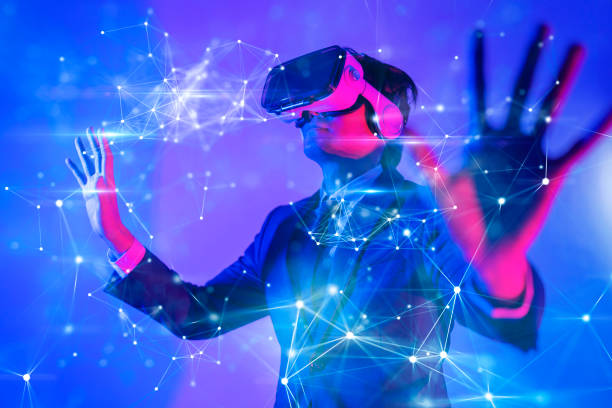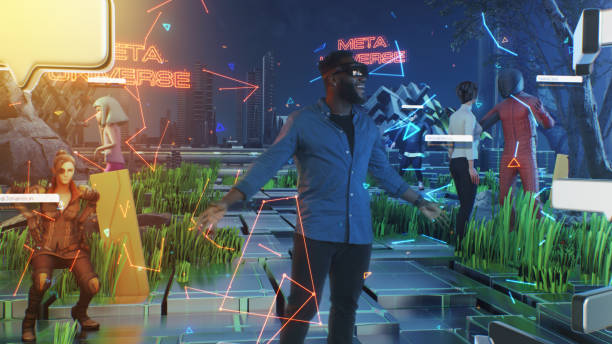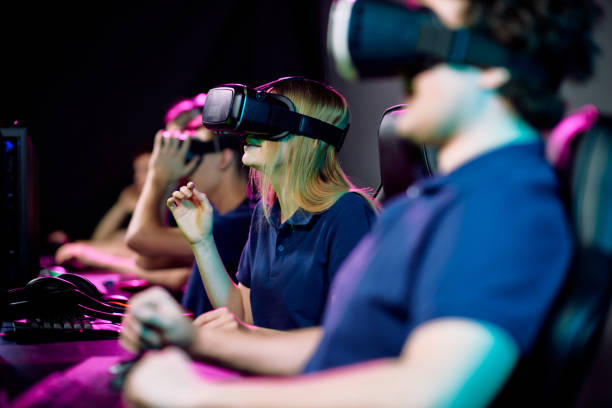Creating the Perfect Event, Together
Tell us about your event, and hire4event will craft an experience you'll cherish forever. Start planning today!
Tell us about your event, and hire4event will craft an experience you'll cherish forever. Start planning today!
Book Best Artist From Popular Cities
Book Best Artist For Overseas Locations
Book Top Event Venues in Popular Cities
Book Top Event Equipment for Rent in Popular Cities
Interesting information
In the vibrant landscape of India, where traditions seamlessly blend with modernity, a new wave of innovation is transforming the way we experience events. Virtual Reality (VR) has emerged as a groundbreaking technology, creating immersive and unforgettable experiences that transcend the boundaries of time and space.
As the world navigates through the challenges of the digital age, the integration of VR into events is revolutionising the way we connect, engage, and celebrate.
India has always been at the forefront of embracing technological advancements, and the growing popularity of VR is no exception. From corporate conferences to cultural festivals, the demand for immersive experiences is on the rise.
Virtual reality allows event organisers to break free from the limitations of physical venues, enabling participants from diverse locations to come together in a shared virtual space.
One of the most exciting applications of VR in the Indian context is its potential to enhance cultural celebrations. Imagine being able to virtually attend major festivals like Diwali, Holi, or Navratri from the comfort of your home.
VR can recreate the ambiance, music, and vibrant colours of these events, allowing participants to feel the festive spirit as if they were right there in the midst of the celebration.
In the corporate world, VR is reshaping the landscape of conferences and trade shows. Professionals from different parts of India and the world can converge in a virtual conference hall, eliminating the need for extensive travel and accommodation expenses. Virtual booths and interactive networking spaces provide a dynamic platform for business interactions, fostering collaboration and innovation.
The education sector in India is also embracing VR to provide students with immersive learning experiences. From historical tours to interactive science experiments, VR enables students to explore subjects in ways never before possible. Imagine a virtual field trip to the Taj Mahal or a biology lesson with 3D models—the possibilities are limitless.
One of the key advantages of incorporating VR into events is the ability to make them more inclusive. Virtual experiences can be tailored to accommodate individuals with disabilities, ensuring that everyone can participate and enjoy the event to the fullest. This inclusivity aligns with the diverse and pluralistic ethos of India.
While the potential of VR in events is vast, there are challenges that need to be addressed. Technological barriers, cost considerations, and the need for widespread adoption are hurdles that must be overcome. However, the prospect of creating unique and engaging experiences for participants presents immense opportunities for event organisers, businesses, and content creators.
The Virtual Reality revolution is well underway, and India is at the forefront of embracing this transformative technology. From cultural celebrations to corporate conferences, the immersive experiences offered by VR have the potential to redefine the way we connect and engage in events. As technology continues to evolve, the future of events in India is set to become even more dynamic, inclusive, and unforgettable through the lens of Virtual Reality.
Virtual Reality (VR) has significantly transformed both the event and gaming industries, offering immersive and interactive experiences that were once only imaginable. Let's delve into the role of VR in shaping these two domains:
VR brings a new dimension to events by creating immersive environments that engage all senses. Participants feel like they are physically present in a different location, enhancing the overall experience.
Virtual events using VR technology allow participants from around the world to attend without the constraints of physical presence. This global accessibility opens up new opportunities for networking, collaboration, and knowledge-sharing.
VR eliminates the need for extensive travel, accommodation, and venue costs. This makes virtual events more cost-effective for both organisers and attendees, broadening access to a wider audience.
In corporate settings, VR is utilised for employee training and workshops. It provides realistic simulations, allowing participants to practice skills or scenarios in a safe and controlled virtual environment.
Companies can use VR to launch products or showcase prototypes in a virtual space. This allows for interactive demonstrations and product experiences, making it more engaging for potential customers.
VR technology can be tailored to accommodate individuals with disabilities, fostering inclusivity at events. Features like closed captions, sign language interpretation, and adaptable interfaces make virtual events more accessible to a diverse audience.
VR platforms often come equipped with analytics tools that allow event organisers to gather data on participant behaviour and engagement. This data can be invaluable for improving future events and tailoring content to meet the audience's preferences.
VR elevates gaming experiences by immersing players in a virtual world where they can interact with the environment and characters in ways that traditional gaming cannot replicate.
VR allows for realistic simulations in gaming, creating environments that mimic real-world scenarios. This is particularly impactful in genres like racing or flight simulation games.
Multiplayer VR games enable users to connect with friends or other players in a shared virtual space. The social aspect of gaming is heightened as players can communicate and collaborate in a more immersive manner.
VR-based fitness games have gained popularity, encouraging physical activity through interactive and entertaining experiences. This contributes to the gamification of exercise, making it more engaging.
VR is being used to develop educational games that provide an immersive and interactive learning experience. Subjects ranging from history to science can be explored through VR-based educational gaming.
In genres like simulation and strategy, VR allows players to visualise and interact with architectural designs, city planning, or strategic landscapes in a way that enhances strategic thinking and decision-making.
VR gaming continues to evolve with advancements in hardware and software. Innovations such as haptic feedback, realistic graphics, and improved motion tracking contribute to a continuously evolving and exciting gaming landscape.
In conclusion, the role of Virtual Reality in both events and gaming is transformative, offering unique and engaging experiences that push the boundaries of what is possible in the digital realm. As technology continues to advance, we can expect even more innovative applications of VR in these domains.
A customised Virtual Reality (VR) experience is a tailor-made immersion that caters to specific needs, preferences, or objectives. Whether for business, education, entertainment, or personal use, creating a customised VR experience involves crafting a virtual environment that aligns with the desired goals. Here are some key aspects to consider when developing a customised VR experience:
Define the purpose of the VR experience. Is it for training, marketing, education, entertainment, or a specific event? Identify the target audience and their preferences to tailor the content accordingly.
Develop or acquire content that suits the goals of the VR experience. This may include 3D models, videos, interactive elements, or a combination of different media. Ensure that the content aligns with the narrative and objectives.
Pay attention to the design of the virtual environment. Create an immersive and visually appealing space that enhances the overall experience. Consider factors like spatial audio, realistic textures, and interactive elements to engage users.
Incorporate interactive elements that allow users to engage with the VR environment. This can include gesture-based controls, voice commands, or controllers for a hands-on experience. The level of interactivity depends on the goals of the experience.
Provide customisation options within the VR experience to cater to individual preferences. This could involve allowing users to personalise avatars, adjust settings, or choose specific paths within the virtual environment.
Design the VR experience to be adaptable to different devices and scalable for various purposes. Ensure compatibility with different VR headsets and platforms, making it accessible to a wider audience.
Tailor the VR experience to individual users whenever possible. This can be achieved through user profiles, preferences, or adaptive learning algorithms that adjust the content based on user interactions and feedback.
If the goal is to simulate real-world scenarios, focus on creating a realistic environment. This is particularly relevant for training simulations, architectural visualisations, or any application where authenticity is crucial.
Integrate feedback mechanisms within the VR experience to gather user insights. This can include surveys, analytics tools, or interactive elements that allow users to provide feedback on their experience.
Prioritise the security and privacy of users, especially if the VR experience involves sensitive information. Implement measures to protect user data and ensure compliance with privacy regulations.
Conduct thorough testing of the VR experience with a diverse group of users to identify potential issues or areas for improvement. Iterate on the design based on user feedback to enhance the overall experience.
Explore opportunities to integrate VR with other emerging technologies, such as augmented reality (AR), artificial intelligence (AI), or the Internet of Things (IoT), to create a more comprehensive and innovative experience.
Creating a customised VR experience requires a thoughtful and iterative approach, taking into account the specific goals, audience, and technological considerations. By focusing on user engagement, interactivity, and adaptability, a customised VR experience can deliver a truly unique and memorable virtual journey.
That's fantastic! Being involved in providing customised virtual reality experiences and experience zones is an exciting venture, especially in an era where immersive technology is becoming increasingly popular. Here are some key points you might consider emphasising in your marketing or communications:
Highlight your ability to create bespoke virtual reality experiences that cater to the unique needs and objectives of your clients. Whether it's for corporate training, marketing campaigns, or entertainment events, your customisation capabilities can set you apart.
Showcase your expertise in content creation for virtual reality. Highlight the quality and innovation embedded in your 3D models, videos, and interactive elements. This is crucial in conveying the level of immersion your experiences can provide.
Illustrate the versatility of your virtual reality solutions by showcasing successful projects across various industries. From corporate training simulations to virtual marketing events, demonstrate how your experiences have made an impact.
Emphasise the level of user engagement and interactivity integrated into your experiences. Whether through gesture controls, voice commands, or other interactive elements, let potential clients know that your VR experiences are designed for active participation.
Highlight that your virtual reality experiences are adaptable to different VR headsets and platforms. This flexibility ensures that your clients can reach a broader audience without being restricted to a particular hardware or software ecosystem.
Promote your expertise in creating immersive experience zones. Whether it's for events, trade shows, or permanent installations, communicate how your experience zones can captivate and engage audiences in unique ways.
If applicable, showcase how your VR experiences are being utilised for realistic simulations, especially in the context of corporate training. Illustrate how your solutions provide effective and memorable training environments.
Emphasise the personalisation options available in your VR experiences. Whether it's allowing users to customise their avatars or tailoring the content to their preferences, communicate that your experiences are designed with individual users in mind.
Assure potential clients of the security and privacy measures implemented in your VR experiences. This is particularly important if your solutions involve handling sensitive information or proprietary content.
Share success stories and testimonials from satisfied clients who have benefited from your customised virtual reality experiences. This adds credibility and demonstrates the practical impact of your services.
Showcase any innovative technological integrations, such as combining virtual reality with augmented reality, artificial intelligence, or other cutting-edge technologies. This positions your services at the forefront of technological advancements.
Highlight your commitment to continuous innovation. Showcase any ongoing research and development efforts or upcoming features that will keep your virtual reality experiences ahead of the curve.
Communicate your openness to collaboration. Whether it's partnering with other tech firms, event organisers, or businesses, convey that you are ready to work together to create exceptional virtual reality experiences.
By effectively communicating these points, you can position Hire4Event as a leading provider of customised virtual reality experiences and experience zones, fostering trust and interest among potential clients.

That's a fantastic offering! Renting virtual reality hardware with customised content for realistic experiences can be a game-changer for various events and industries. Here are some key points to emphasise when marketing this service:
Highlight that Hire4Event provides a one-stop solution for virtual reality experiences by offering not just custom content but also the necessary hardware. This eliminates the need for clients to source VR equipment separately.
Showcase the state-of-the-art virtual reality hardware available for rent. Include details about the quality of VR headsets, controllers, and any additional peripherals, emphasising their cutting-edge features for an immersive experience.
Emphasise the customisation aspect of your service. Whether it's for corporate events, trade shows, or entertainment purposes, let clients know that the content is tailored to their specific goals and requirements.
Communicate that the combination of your hardware and customised content results in realistic and immersive virtual experiences. This is particularly appealing for industries where simulation and lifelike scenarios are crucial.
Assure clients that the VR hardware rental process is seamless and user-friendly. Provide details about the setup process and highlight any technical support or assistance that comes with the rental service.
Offer flexible rental packages to cater to various needs and durations. Whether clients need VR hardware for a one-day event, a week-long exhibition, or an extended project, provide customised rental options.
Showcase the versatility of your service by illustrating how virtual reality hardware rentals can benefit different industries. From corporate training sessions to product launches, convey the adaptability of your offerings.
Highlight the quality assurance measures in place for your VR hardware. This includes regular maintenance, thorough testing, and ensuring that all equipment is in optimal condition before it reaches the client.
Emphasise that your VR hardware rental service is scalable, catering to events of varying sizes. Whether it's a small business meeting or a large-scale conference, communicate that your service can adapt to the event's requirements.
Share success stories and testimonials from clients who have rented VR hardware from Hire4Event. Illustrate how your services have contributed to the success of their events or projects.
Consider organising interactive demos or showcases to allow potential clients to experience the quality of your VR hardware and customised content firsthand. This experiential approach can be persuasive in winning new clients.
Clearly outline your pricing model, ensuring transparency for potential clients. Clearly communicate what is included in the rental package, any additional costs, and the value clients can expect.
By effectively conveying these key points, you can position Hire4Event as a leading provider of not just virtual reality content but a complete solution that includes cutting-edge hardware for realistic and immersive experiences.











